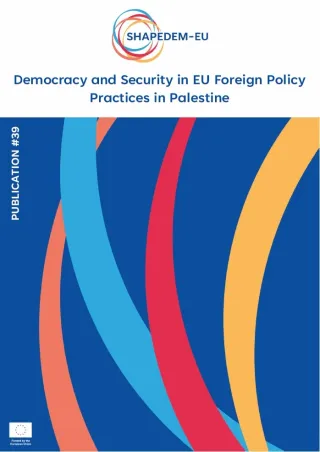Titolo completo
Democracy and Security in EU Foreign Policy Practices in Palestine
This paper critically examines the democratic quality of the European Union’s (EU) foreign policy in Palestine, focusing on security and civil society support. Using the framework of social embeddedness, empowerment and accountability, it assesses whether EU interventions foster genuine democratic practices or reinforce technocratic, externally driven governance. The analysis examines EU policies in the wake of the 7 October 2023 Hamas attacks and the subsequent intensification of Israel’s violence on Gaza and the West Bank, highlighting how these events exposed contradictions and critical limitations in the EU’s democracy and security interventions. Findings show that EU security initiatives, such as EUPOL COPPS, prioritise technical capacity-building over inclusive governance, sidelining grassroots actors and reinforcing elite-dominated structures. EU support for civil society disproportionately benefits donor-dependent NGOs, imposing conditions that limit political engagement and marginalise local movements and claims for self-determination. Accountability mechanisms for affected communities are weak, and EU policies often align with external security interests, particularly Israel, rather than Palestinian democratic needs. The paper concludes that meaningful (un)learning requires shifting toward locally embedded, rights-based strategies that empower Palestinian actors, strengthen accountability and promote democratic governance aligned with Palestinian aspirations.
Abstract
Introduction
1 Conceptual definition of democraticness
2 Assessing Democraticness of EU Foreign Policy Practices in Palestine
2.1 A security-first paradigm
2.1.1 Social empowerment
2.1.2 Social embeddedness
2.1.3 Social accountability
3 Absence of (un)learning
Conclusion
Bibliography
List of interviews


